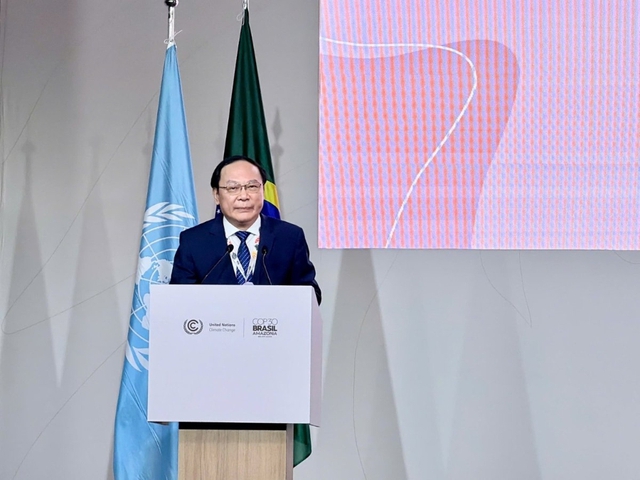Viet Nam makes three proposals at COP30
VGP - Viet Nam proposed that developed countries fully fulfill their financial commitments, taking the lead in mobilizing at least US$300 billion annually and moving toward a roadmap of US$1.3 trillion per year to support developing countries, said Deputy Minister of Agriculture and Environment Le Cong Thanh.

Deputy Minister of Agriculture and Environment Le Cong Thanh
Le announced the proposals while delivering a statement at the High-Level Segment of the 30th Conference of the Parties to the UN Framework Convention on Climate Change (COP30) on November 18 (local time) in Brazil.
COP30 is taking place in a context where humanity is facing increasingly extreme and unpredictable climate change, causing severe and dangerous impacts.
The head of the Vietnamese delegation at COP30 emphasized that "to realize the goals set out in the Paris Agreement, we need unity in both perception and action; we must uphold multilateralism and strongly reinforce solidarity and cooperation among all nations and peoples, based on the principle of 'common but differentiated responsibilities and respective capabilities'."
With this spirit, Viet Nam put forward several key proposals as follows:
First, developed countries, with their financial, scientific, and technological capacities, must fully meet their responsibilities and make stronger commitments to reducing greenhouse gas emissions.
Second, developed countries must fully deliver on their financial commitments, taking the lead in mobilizing at least US$300 billion annually and moving toward a roadmap of US$1.3 trillion per year to support developing countries. Specifically, it is essential to urgently rebalance financial resources for adaptation and mitigation, while significantly increasing grants and concessional loans. Funding for adaptation should account for at least 50 percent of total climate finance provided to developing countries.
Third, it is necessary to urgently scale up and fully implement the "Early Warnings for All" (EW4All) initiative to protect people's lives and property from increasingly severe climate-related disasters.
Viet Nam consistently pursues sustainable development, harmonizing economic growth with environmental protection and climate action. The country continues to refine its institutions and policies, gradually creating a coherent and comprehensive legal framework for adaptation, greenhouse gas emissions reduction, and a just energy transition, with new and breakthrough mechanisms aimed at promoting green transformation and carbon-neutral development.
The role of the UN must be further strengthened in establishing and enhancing an effective global governance system and in promoting cooperation among nations to address non-traditional security challenges, including climate change.
As one of the developing countries most heavily affected by global climate change, Viet Nam has been seriously fulfilling its international commitments on adaptation and greenhouse gas emissions reduction, the Deputy Minister said.
Viet Nam remains committed to sustainable development, balancing economic growth, environmental protection, and climate response. The country continues to strengthen its institutions and policies, gradually building a coherent and synchronized legal framework for adaptation, greenhouse gas emissions reduction, and a just energy transition with new, breakthrough mechanisms to foster green transformation and carbon-neutral development./.

